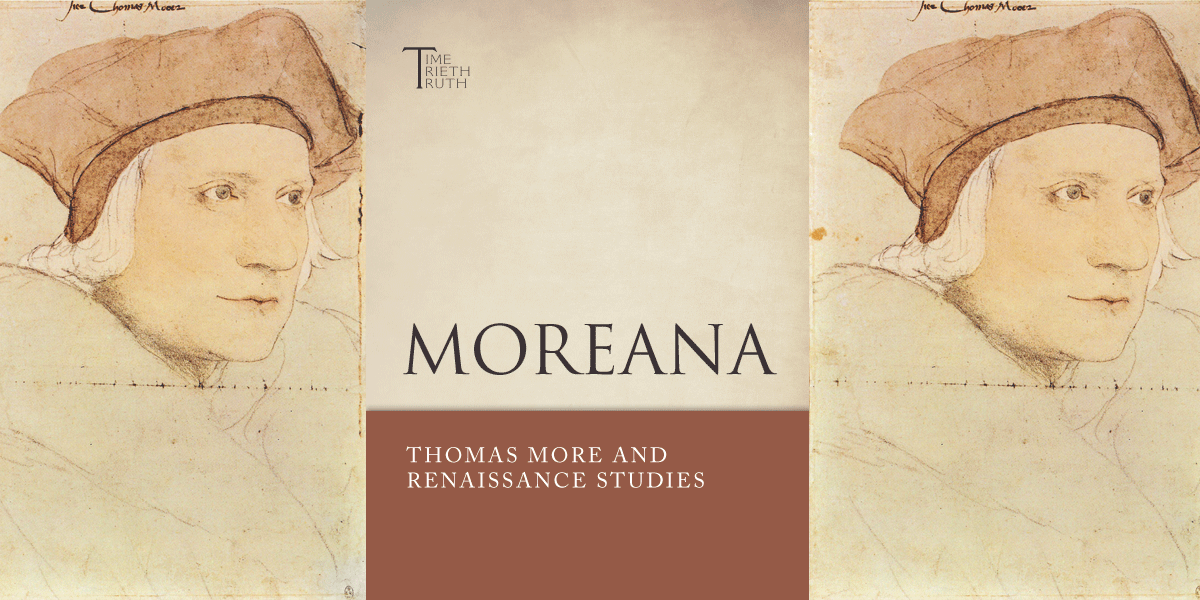
Sir Thomas More (1477 – 1535) was the first person to write of a ‘utopia’, a word used to describe a perfect imaginary world. The term was first published in 1516, and became the short title of his book about an island of “wisely and well trained citizens.” Exactly what such training means and what constitutes its political import are contested questions for the authors of a Round Table conversation on the significance of More’s masterpiece, in the journal Moreana.
Walter Nicgorski begins that conversation with an analysis of what he calls “the Utopic tradition into which More fits.” Such a tradition focuses upon a predominately Platonic sense of “the moral and political dimension of human beings,” but with the caveat that More, like Augustine before him, recognizes “how pride contaminates all our endeavors.” Thus, More’s “Christianity could reinforce the lessons of the pagan utopic tradition that one must be wary of claims and inclinations about the perfection of our goals.”
Richard Strier and William Junker, however, question Nicgorski’s position. Strier points out that Raphael explicitly claims pride has no place in Utopia. Instead of a search for contradictions or ironic claims, Strier invites readers to side with the character of Raphael over the character of “More” in order to discover “the true nature” of More’s vision. At the center of that vision, the authorial More teaches his readers “to think about Utopian institutions as a system, and a system that is designed to produce persons of particular sort.” More employs a holistic understanding of society as a complete system in what “might be said to be the invention of social science.” To discover the “brilliance” of More’s imagined commonwealth, then, we should take Utopian institutions as serious and positive recommendations for shaping human behavior.

In the third essay, William Junker contextualizes the differences between Nicgorski and Strier as the contrast “between an (late) Augustinian and a (radical) Christian-Aristotelian theology of Original Sin.” In Junker’s analysis, those who trace More’s book back to Augustine’s City of God emphasize the political debilities of human pride and correspondingly favor ironic readings of the idealism found in Utopia. Yet both Thomas Aquinas and Dante Alighieri teach how “the basic goodness of human nature” corresponds to that nature’s malleability, a position that raises the question of social and political practices in the ethical development of human beings. “In 1516 at least,” Junker suggests of Utopia, Thomas More “was willing to depart from Augustinian orthodoxy on the question of (fallen) human nature.”
In the final contribution, David Harris Sacks proposes Utopia as a gift from More to Erasmus and partially in response to Praise of Folly. Though More and Erasmus both believe in “the nobility of moral accomplishment, rather than of birth or inherited wealth,” the objections of the character “More” question whether moral excellence can be achieved without private property. The capacity to act purposefully or generously in the disposal of individual goods also “points to a serious, insuperable, hindrance” to Utopia: Either “people are too self-regarding” to hold all things in common, or “there is no way to eliminate private property, once it is in place,” unless humanists like Raphael “immerse themselves in the murkiness of politics,” an initiative Raphael flatly rejects. For Sacks, as with Nicgorski, the problem of sin and pride ultimately prevent the formation of Utopian regimes.
Though the essays in this Round Table originate from different conferences in the last year, a dialectical conversation among them becomes apparent.
Find out more about Moreana and read the full Round Table and essays in this issue here.
You might like to browse other EUP Blog posts on related subjects here





